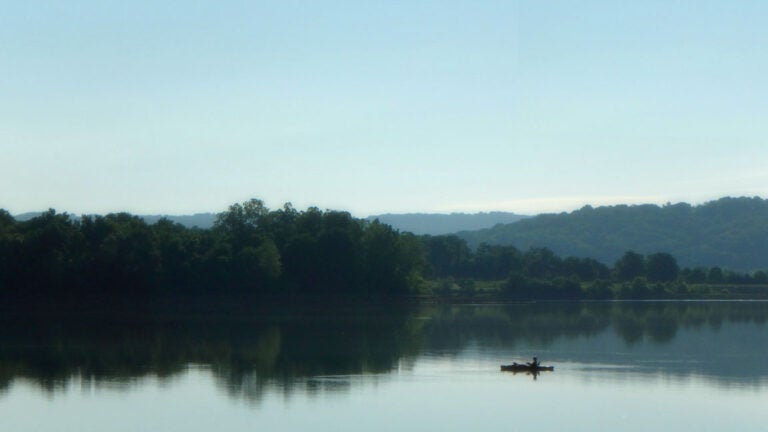N.J. Assembly panel clears bill requiring stewardship plans for public forests
Environmentalists object, saying the measure would mean more logging and more habitat loss.

There is concern about the potential impact of the bill on core forest in the Highlands Preservation Area. (Saebaryo CC BY-ND 2.0)
This story originally appeared on NJ Spotlight.
___
Anytime a forest is acquired by a government or nonprofit, the state would be required to write a “stewardship plan,” under a bill approved Monday despite a storm of protest from environmentalists who argued that the measure would lead to more logging and more destruction of public lands if it becomes law.
The Assembly Agriculture Committee on Monday voted unanimously to release bill A-4843 as well as three related measures that would mean municipalities would not have to approve forest stewardship plans; that would set minimum acreage goals for prescribed burns in the Pinelands and statewide, and that would seek cooperation between government and landowners in setting stewardship plans.
A-4843, the most controversial of the measures, would require the state Department of Environmental Protection to write a stewardship plan for any forest of 25 acres or more acquired by the state for conservation or recreation. Local governments or conservation groups would also have to write stewardship plans for any forests they acquired for the same purposes, and their plans would have to be approved by the DEP.
The federal government originally intended forest stewardship plans to protect, manage and enhance the resources — such as soil, water, wildlife and aesthetics —of privately owned land. In New Jersey, they were expanded by the Christie administration to include public lands.
But opponents of the new bills said they are likely to mean more logging, erosion, runoff and degradation of wildlife habitat.
Impact on soil health, wetlands, biodiversity
Elliott Ruga, policy and communications director for the New Jersey Highlands Coalition, opposing A-4843, said it is likely to lead to traditional forestry practices that would be damaging to such aspects as soil health, wetlands and biodiversity.
“What works for a post-agricultural woodlot will not work for a mature forest parcel that is part of a large, mature, contiguous forest,” he said.
Current best practices for forest management must consider biodiversity and climate resiliency but neither of those are considerations in DEP’s forestry rules, Ruga said.
“We are concerned about the impact this bill would have on core forest of the Highlands Preservation Area, especially since forest stewardship plans are inexplicably exempt from the Highlands Act in DEP’s Highlands regulations,” Ruga told the Agriculture Committee during the almost two-hour hearing.
At the county or municipal level, compliance with the requirement to write a stewardship plan would be an added cost that is not provided for in the bill, and would therefore be an unfunded mandate, which is prohibited by the New Jersey Constitution, Ruga said.
Ruga and other critics, including the New Jersey Conservation Foundation and Raritan Headwaters, said the cost of meeting the plan requirement would increase the risk that local governments would sell lumber from the forests to pay for writing the plans.
“We must ask whose interests are served when we pressure municipalities and counties to log their forests,” he told the panel.
Jeff Tittel, director of the New Jersey Sierra Club, said the bill would make it more likely that owners of public lands would log them to pay for the required stewardship plans.
‘A horrible sell-out of our forests’
“This is a horrible sell-out of our forests because they can get thousands of dollars for big trees like oaks,” he said, after the committee vote. “This legislation will mean more stormwater runoff, more silt and pollution in our waterways, and will release more carbon. It will also result in limiting public access and environmental damage to wetlands, waterways, and forest habitats.”
But Edward Wengryn of the New Jersey Farm Bureau urged the committee to pass all four bills, saying that owners of public land are required under the DEP’s stewardship plans to take into account a range of environmental conditions, not just the land’s suitability for logging.
“For those who are concerned you are not looking at the whole forest, that’s what a stewardship plan is,” he said. “We’re not talking just woodlot management plans, we’re talking stewardship, and that’s all the natural resources, and water, wildlife and plants.”
While the Farm Bureau supports the bills, Wengryn also called for more funding for the DEP to “do it right,” and he urged lawmakers to make sure the bills are funded as they go through the legislative process.
New Jersey Audubon lends support
All four bills also won the support of New Jersey Audubon, which went against all the other environmental groups at the hearing. Drew Tompkins of the conservation group rejected claims that forest management means logging.
“Science-based forest management is key to making healthy, safe and ecologically diverse forests,” especially in densely populated New Jersey, with its many fragmented forests, he said.
Tompkins also argued that setting acreage standards for prescribed burning, as proposed in one of the bills, would be part of the fight against climate change because it would reduce the area of combustible material that could be ignited in times of high temperatures with a massive release of carbon into the atmosphere.
“The continued degradation of healthy forests by non-native plants and pests like over-abundant deer directly impact our forests’ ability to store carbon,” he said. “If we see our forests converted to less diverse strands of trees and shrubs, we will see a direct decrease in the amount of carbon sequestered.”
WHYY is your source for fact-based, in-depth journalism and information. As a nonprofit organization, we rely on financial support from readers like you. Please give today.







